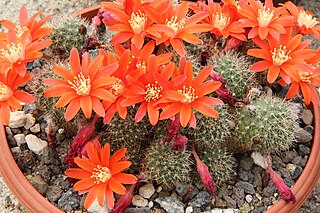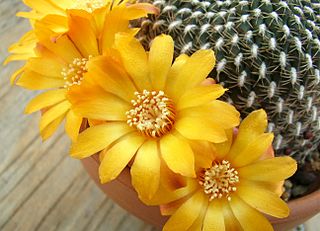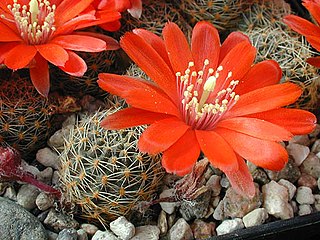
The Royal Horticultural Society (RHS), founded in 1804 as the Horticultural Society of London, is the UK's leading gardening charity.

Horticulture is the agriculture of plants, mainly for food, materials, comfort and beauty for decoration. Horticulturists apply knowledge, skills, and technologies to grow intensively produced plants for human food and non-food uses and for personal or social needs. Their work involves plant propagation and cultivation with the aim of improving plant growth, yields, quality, nutritional value and resistance to insects, diseases and environmental stresses. They work as gardeners, growers, therapists, designers, and technical advisors in the food and non-food sectors of horticulture.

Rebutia is a genus in the family Cactaceae, native to Bolivia and Argentina. They are generally small, colorful cacti, globular in form, which freely produce flowers that are relatively large in relation to the body. They have no distinctive ribs, but do have regularly arranged small tubercles. They are considered fairly easy to grow and they may produce large quantities of seeds that germinate freely around the parent plant.

The Hampton Court Garden Festival is the largest flower show in the world. The show is held in early July. The show is run by the Royal Horticultural Society (RHS) at Hampton Court Palace in the London Borough of Richmond upon Thames. The show features show gardens, floral marquees and pavilions, talks and demonstrations. Erected on the north and south sides of the Long Water in Hampton Court Park, it is the second major national show after the Chelsea Flower Show but has a different character, focusing more on environmental issues, growing your own food and vegetables and cookery, as well as selling gardening accessories, plants and flowers.

The Award of Garden Merit (AGM) is a long-established annual award for plants by the British Royal Horticultural Society (RHS). It is based on assessment of the plants' performance under UK growing conditions.
The Victoria Medal of Honour (VMH) is awarded to British horticulturists resident in the United Kingdom whom the Royal Horticultural Society Council considers deserving of special honour by the Society.

RHS Garden Hyde Hall is a public display garden run by the Royal Horticultural Society in the English county of Essex. It is one of five public gardens run by the Society, alongside Wisley in Surrey, Harlow Carr in North Yorkshire, Rosemoor in Devon, and Bridgewater in Greater Manchester.

RHS Garden Rosemoor is a public display garden run by the Royal Horticultural Society in north Devon, England.

Hadlow College is a further and higher education college in Hadlow, Kent with a satellite site in Greenwich. The curriculum primarily covers land-based subjects including Agriculture, Horticulture, Conservation and Wildlife Management, Animal Management, Fisheries Management, Equine Studies and Floristry. Additionally, intermediate and advanced apprenticeships are offered in Golf Greenkeeping, Sports Turf, Agriculture, Horticulture and Land-based Engineering.

Parodia magnifica is a species of flowering plant in the cactus family Cactaceae, native to southern Brazil. One of several species called ball cactus, it grows to 7–15 cm (3–6 in) tall by 45 cm (18 in) broad, with heavily ribbed, spherical to columnar, spiny and hairy stems, bearing pale yellow flowers in summer. Its natural habitat is cool, dry temperate grassland at elevations of up to 800 m (2,600 ft). Populations are sparse and fragmented, and it has been designated as “Endangered” by the IUCN Red List.

Rosa'Buff Beauty' is an apricot Hybrid musk rose cultivar, bred by Ann Bentall and introduced into Great Britain in 1939. Bentall and her husband, John Bentall, inherited the rose fields of acclaimed rose breeder, the Reverend Joseph Pemberton after his death in 1926. The rose was awarded the Royal Horticultural Society's Award of Garden Merit in 1993.

Rebutia fiebrigii, the orange crown cactus or flame crown, is a species of flowering plant in the cactus family that is native to exposed rocky plateaux in the Bolivean Andes, at altitudes of 2,100–4,000 m (6,900–13,100 ft) above sea level. It consists of a solitary ball some 15 cm (5.9 in) in diameter, covered in tubercles and silky hairs, with brilliant orange daisy-like flowers. In time these balls multiply to form mounds.

Pierre Rebut was a French botanist who specialized in cacti, the genus Rebutia is named after him. He was born in France in the year 1827, and died in the year 1902. He was awarded a gold medal by the Côte-d'Or Society of Horticulture and Arboriculture for having a large collection of cacti. In addition to cacti, his personal collection also included Crassula, Aloe, Agave, and Mesembryanthemum. His collection was also considered noteworthy by the Lyonnais Horticultural Society due to the aforementioned wide variety of species and rarity of some of the plants. He was the first person to describe Rebutia minuscula as a species.

Pilosocereus leucocephalus, called old man cactus, old man of Mexico, tuno, and woolly torch, is a species of cactus in the genus Pilosocereus, native to Mexico and Central America. It has gained the Royal Horticultural Society's Award of Garden Merit.

Rebutia arenacea, the arenaceous crown cactus, is a species of cactus in the genus Rebutia, native to central Bolivia. It has gained the Royal Horticultural Society's Award of Garden Merit.

Rebutia mentosa, the crown cactus, is a species of cactus in the genus Rebutia, native to Bolivia. It has gained the Royal Horticultural Society's Award of Garden Merit.

Rebutia neocumingii, the Cuming crown cactus, is a species of cactus in the genus Rebutia, native to Bolivia and Peru. It has gained the Royal Horticultural Society's Award of Garden Merit.

Rebutia pulvinosa is a species of cactus in the genus Rebutia, native to Bolivia. Two of its subspecies, Rebutia pulvinosa subsp. albiflora and Rebutia pulvinosa subsp. perplexa, have gained the Royal Horticultural Society's Award of Garden Merit.

Rebutia pygmaea is a species of cactus in the genus Rebutia, native to Bolivia and northwest Argentina. It has gained the Royal Horticultural Society's Award of Garden Merit.

Rebutia steinbachii, called Steinbach's crown cactus, is a species of cactus in the genus Rebutia, native to Bolivia. It has gained the Royal Horticultural Society's Award of Garden Merit.




















